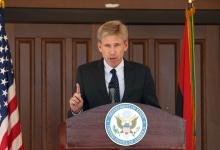libya

The Associated Press reports
“BENGHAZI, Libya (AP) — U.S. drones hovered over the eastern city of Benghazi on Friday and militia forces fired toward the crafts, prompting authorities to close the airport for several hours for fear a commercial aircraft could be hit, Libyan officials said.
“Abdel-Basit Haroun, the head of the militia in charge of city security, said the drones could easily be spotted from the ground. He says men angry over perceived foreign intervention fired in the air and authorities closed the airport.
"The drones are like bees," he said, referring to the long hours the drones were seen, with their buzzing noise heard in different neighborhoods of Benghazi. Militias, known as brigades, fought regime forces during Libya's eight-month civil war that led to Moammar Gadhafi's fall last year. Since then, many have roles in keeping security, though they have not been integrated into government forces.
“An airport official confirmed the firing on the drones was the reason for the airport shutdown.”

When inflamed mobs stormed the U.S. embassies in Libya and Egypt on Tuesday, the media quickly looked to a likely spark.
Florida Pastor Terry Jones ignited deadly riots by threatening to burn Qurans in 2010, and by torching the Islamic holy text last year. Recently, Jones said he would promote a crude film that portrays Islam’s Prophet Muhammad as a foolish sexual pervert.
But in the days before the protests, Jones made no public mention of the film — called Innocence of Muslims — even as he prepared to stage an “International Judge Muhammad Day” on Sept. 11.
Instead, the man who translated the film into Arabic, sent it to Egyptian journalists, promoted it on his website and posted it on social media was an obscure Egyptian-born Coptic Christian who lives near Washington and proudly touts his ties to Jones.

I finally sat down and watched the entire 11-plus minute video, Innocence of Muslims, which is at the heart of the recent outrage in Islamic countries in Yemen and north Africa. Suffice it to say, I lost a healthy share of brain cells in the process. The narrative – if you can call it that – is incoherent throughout, the sound is barely audible in places and the overall production values make the Annoying Orange series look like Scorsese.
That said, there’s plenty to anger Muslims in this clip, or anyone who values religious tolerance, plural coexistence, or even basic respect for human nature.

During the Libyan revolution, U.S. drones were a significant part of the NATO forces involved, carrying out nearly 150 attacks. But when the conflict ended, the drones stayed. CNN reported in June:
“A senior Libyan official told CNN that the U.S. is flying surveillance missions with drones over suspected jihadist training camps in eastern Libya because of concerns over rising activity by al Qaeda and like-minded groups in the region but said that to the best of his knowledge, they had not been used to fire missiles at militant training camps in the area.”
Following yesterday’s attack in Benghazi that killed U.S. Ambassador Chris Stevens and three other Americans, President Obama declared that the killers would be found and that “justice will be done.”
CNN reported today on the military role in that "justice:"
The Pentagon dispatched a contingent of Marines to Libya, moved warships toward its coast, and planned to use drones in a stepped up search for those responsible for an attack on a U.S. consulate that killed the American ambassador and three others.”
A “senior military official” provided more details on the planned use of drones
“American drones also were expected to join the hunt for potential targets. They would be part of "a stepped-up, more focused search" for a particular insurgent cell that may have been behind the attack, the official said. The unmanned surveillance aircraft are expected to fly over Benghazi and other areas of eastern Libya to look for militant encampments.”
And, while the reports now are only of surveillance, an educated guess would suggest that the drones are (or soon will be) armed, and that missiles will likely be fired.

Muslim Americans condemned violence in Egypt and Libya that left four Americans dead, but remain concerned that the deaths could rekindle anti-Muslim sentiment just as post-9/11 resentment was starting to ebb.
U.S. Ambassador to Libya Christopher Stevens and three embassy workers were killed on Tuesday when fundamentalist protestors attacked the U.S. consulate in Benghazi, Libya, in response to a low-budget film that attacks Islam’s Prophet Muhammad, reportedly made by an Israeli real estate developer who lives in California.
Imam Talal Eid, the Islamic chaplain at Brandeis University near Boston and a former member of the U.S. Commission on International Religious Freedom, predicted the violence would lead to “more resentment” against Muslims, who he criticized for not doing enough against terrorism.

The Vatican confirmed on Wednesday that Pope Benedict XVI's visit to Lebanon will go ahead as planned, despite growing tension in the region after the killing of the U.S. ambassador to Libya by a mob enraged by an anti-Islam film.
The Vatican's chief spokesman, the Rev. Federico Lombardi, said the Vatican was closely monitoring developments in the region but there were no signs of specific security concerns for Benedict's trip so far.
Benedict is scheduled to leave Friday for a three-day visit to Lebanon despite rising instability spilling over from a deadly civil war in neighboring Syr
Editor's Note: The following is the statement by Secretary of State Hillary Clinton following the tragic events in Libya Tuesday evening.
Yesterday, our U.S. diplomatic post in Benghazi, Libya was attacked. Heavily armed militants assaulted the compound and set fire to our buildings. American and Libyan security personnel battled the attackers together. Four Americans were killed. They included Sean Smith, a Foreign Service information management officer, and our Ambassador to Libya Chris Stevens. We are still making next of kin notifications for the other two individuals.
This is an attack that should shock the conscience of people of all faiths around the world. We condemn in the strongest terms this senseless act of violence, and we send our prayers to the families, friends, and colleagues of those we’ve lost.

According to Reuters, the U.S. Ambassador to Libya, Christopher Stevens, and three other embassy staff were killed outside a consular building as it was rushed by a mob angered about a U.S. online film insulting the Prophet Mohammad.
"The Libyan official said the ambassador, Christopher Stevens, was being driven from the consulate building to a safer location when gunmen opened fire.
'The American ambassador and three staff members were killed when gunmen fired rockets at them,' the official in Benghazi told Reuters."
After four years of living in the U.S., Mohamed Jedeh is anxious to return to his native Libya.
It irks him that his local mosque in Union City, N.J., won’t broadcast the Muslim call to prayer for fear of angering neighbors, yet nobody complains about the noise from a local bar. Back home, there are no scantily clad women walking across his sight line, and fasting during the holy month of Ramadan is easier because almost everyone is doing it.
Jedeh would probably be home by now if he hadn't been asked by a mosque in Boston to help with special nightly Ramadan prayers. After graduating in May with a master's degree in clinical research from the New York University College of Dentistry, he's ready to get back to the small city of Zintan in northwest Libya, where he plans to teach dentistry and work at a local clinic.
“It’s different,” said Jedeh, who flies back on Aug. 20. “I miss the Islamic atmosphere.”
Despite his homesickness, Jedeh said he has had a positive experience in the U.S. He initially worried about his wife's safety because she wears a niqab, or face veil, but except for one insult shouted by a passerby, he and his family have been treated respectfully.
“I believe you cannot judge any country and say, all people are good or all people are bad,” said Jedeh.

In drone news this week:
The British Ministry of Defense acknowledged that Royal Air Force pilots flew U.S. Predator drones in Libya last year. According to The Guardian, “It is not known how many missions were flown by the British, or how many targets were destroyed by them.”
The Washington Post reported: “The skies over Somalia have become so congested with drones that the unmanned aircraft pose a danger to air traffic and potentially violate a long-standing arms embargo against the war-torn country, according to United Nations officials. In a recently completed report, U.N. officials describe several narrowly averted disasters in which drones crashed into a refugee camp, flew dangerously close to a fuel dump and almost collided with a large passenger plane over Mogadishu, the capital.”
Concern over the privacy implications of domestic drone use is growing, reports the Washington Times. From the report: “This week, Rep. Ted Poe, a Texas Republican and former judge, will introduce the Preserving American Privacy Act, which sets strict limits on when, and for what purpose, law enforcement agencies and other entities can use unmanned aerial vehicles, or UAVs.”
As many as six missiles were fired from drones on a “militant hideout” in northwestern Pakistan on Monday, killing at least 12 “suspected militants.” Read stories in DAWN, CNN, Reuters, AFP.
For The Daily Beast, Jamie Dettmer writes:
"At times there are two competing realities in post-Gaddafi Libya. For most ordinary Libyan women, there’s domestic drudgery and subordination to their men. For the more educated, drawn from higher ranks and involved in newly minted nongovernmental organizations (NGOs), there’s hope of change and greater opportunities.
The two realities seldom meet. As Libyans head to the polls this weekend to vote in their first national elections in nearly 50 years, there are two fundamental questions to ask about the prospects for women in post-Gaddafi Libya. Will those two realities ever start overlapping? And will the space that elite women have opened up since Gaddafi’s fall be reduced?"
Read his full article here
Recent analyses of the Arab Spring have questioned the efficacy of nonviolent resistance compared to armed struggle in ousting authoritarian regimes. The relatively expeditious victories of the nonviolent uprisings (not "revolutions," as some suggest) in Tunisia and Egypt stand in stark contrast to Libya, where a disparate amalgam of armed groups, guided politically by the Libyan Transitional National Council (TNC) and backed militarily by NATO, are on the verge of removing Moammar Gadhafi from power. As someone who has written extensively about civil resistance, notably in the Middle East, while at the same time working on the Libya portfolio within the State Department, I've been grappling with the meaning and significance of the Libyan revolution and its possible impact on the region.
First of all, like most people, including my State Department colleagues, as well as democrats and freedom fighters around the world, I am delighted that an especially odious and delusional Libyan dictator is getting the boot. I applaud the bravery and determination of the Libyan people, who have endured four decades of a despicable dictatorship and have made great sacrifices to arrive at this point. I hail the extensive planning that my U.S. government colleagues have undertaken over the past five months, in concert with Libyan and international partners, to support a post-Gadhafi transition process.
Could nonviolent resistance have succeeded in Libya? Here are four points worth considering:
1) The movement was fairly spontaneous, unlike the highly coordinated campaign in Egypt. As Peter Ackerman consistently points out, planning is an essential element to a successful nonviolent revolution. As with any battlefield, a nonviolent campaign requires extensive preparation. But reports seem to indicate that Libyans began protesting in earnest around Feburary 15th, likely inspired by events in neighboring Egypt and Tunisia. Gadhafi seemed prepared for this and immediately cracked down using overwhelming violence. By February 19th, the movement had become violent in response to these crackdowns. Four days of civil resistance doesn't give it much time to work. Egyptian pro-democracy activists struggled for years before seeing Mubarak fall. Syrian oppositionists, thousands of whom have been killed by Bashar al-Assad's regime, have toiled along for the past six months. So, we can't really say whether or not nonviolence would have worked in Libya. It never had a chance to materialize in the first place.
I have gotten so used to stories of violence in the news every morning that I confess they don't move me as much as they should, or used to. Today: Three straight days of killing in Karachi with 42 dead; Syrian tanks shelling the city of Hama, where more than 100 people have died since Sunday; U.N. peacekeepers killed by a landmine in Sudan; daily deaths in Libya; bombings in Baghdad and assassinations in Kandahar. It goes on and on.
It isn't as if the Middle East needed another complication. Tunisia, Egypt, Libya, Yemen -- now Terry Jones? Rev. Jones is a fringe pastor in Gainesville, Florida, who spent about 30 years as a missionary in Europe.